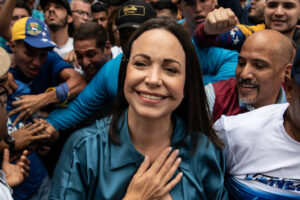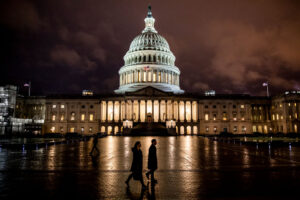Yesterday, those Venezuelans who have not yet fled the country received positive proof that their democracy is dead. Exit polls in Sunday’s national election showed a resounding win for the opposition to socialist dictator Nicolás Maduro. But in today’s Venezuela, it is he who pays the salaries of the election board, the military and the police who wins. And so unsurprisingly, the “official” election results found Maduro winning a third six-year term with 51% of the vote.
Looking at a postcard of Downtown Caracas from 1980, one could be forgiven for assuming that it depicted a different city than the blighted wasteland standing in its place today. That Caracas was a city worthy of “George Washington of the South” Simón Bolívar, who a century and a half earlier had liberated his home country of Venezuela, along with much of South America, from imperial Spanish rule. It was a city of tree-lined boulevards, cosmopolitan cafes, arts and learning. Its central arts centre, the Teresa Carreño, regularly played host to Ray Charles and Luciano Pavarotti. To quote Venezuelan author Ana Teresa Torres: “You truly felt, as we used to say around here, in the first world.” And no less an authority than my mother, who grew up in Buenos Aires and visited Caracas around that time, remembers that it “felt like New York”.
It is a popular oversimplification nowadays to claim that mid-century Venezuela’s “first-world” living standards, sophistication and opulence were built on quicksand. That, like most other Opec nations, Venezuela suffered from “the resource curse” — in that its over-reliance on oil temporarily gave Venezuelans developed-country living standards without compelling the country to build the diversified economy it needed to sustain that level of wealth.
To be sure, there is something to this. The oil price shocks of the Eighties certainly did spark the death spiral that culminated in Venezuela’s collapse. Over that decade and the following one, Venezuela’s economy stagnated and unemployment and poverty increased, fuelling the discontent that would lead the country to throw it all away. But to imply that Venezuela was a mere petrostate is to grossly misrepresent reality — because Venezuela in the Eighties was on its way to figuring out something that most of today’s Middle Eastern petrostates still have not: how to use its wealth to build a broad-based, vibrant, productive mass culture.
During the Eighties and Nineties, Venezuela was the longest continually operating democracy in Latin America. Since 1958, it hosted regular, peaceful elections, and its political parties were generally moderate. Venezuela’s politics lacked the radical swings that characterised the latter half of the 20th century in most of the continent — there were no Bolsonaros or Peróns. Towards the end of the century, the country did experience rising levels of corruption at the bureaucratic level, but the democratic foundations remained.
At this time, Venezuela’s cultural exports were the envy of South America. Consider one extraordinary example: the Venezuelan national music education programme, El Sistema. Founded in 1975 by conductor José Antonio Abreu, El Sistema sought to use music as a vehicle for social uplift and general education. Its rigorous programme catered to students of all social strata, and several of its protégés ended up among the world’s top classical musicians — including Gustavo Dudamel, who was recently named the next music director of the New York Philharmonic Orchestra. Yet today, even as the memory of El Sistema continues to inspire imitators around the world, Venezuela’s own youth music programmes are in a shambles. As of 2017, a third of the members of Venezuela’s flagship Simón Bolívar Youth Orchestra had fled the country.
By the Eighties and Nineties, Venezuela’s economy was beginning to diversify — particularly into manufacturing — but it remained deeply reliant on oil revenue, and thus beholden to that market’s vicissitudes. Oil shocks begot fiscal crises and, by the Nineties, Venezuela’s economy was regularly experiencing either recession, inflation or monetary instability. Perhaps most distressingly, the country’s ability to leverage its cultural resources and high levels of education for economic growth slowed as well. According to one study carried out in 1999, Venezuelans with a 12-year education had a nearly 20% chance of ending up in poverty, up from 2.5% in 1989.
Venezuela found itself at a similar crossroads to the one Chile had faced a quarter century earlier under military dictator Augusto Pinochet. After Chile’s single-resource copper economy ceased to work, the country’s leaders worked to diversify the economy — attracting foreign manufacturing dollars and investing in agriculture, aquaculture and viniculture. These reforms — carried out, admittedly, in an environment of political repression — set the stage for 50 years of economic growth and stability.
What Venezuela needed in the Nineties — frustrated by over-reliance on oil, economic stagnation and bureaucratic corruption — was exactly what Chile had gained in the Seventies: economic leadership. Even at that late date, Venezuela enjoyed many advantages that Chile had not — a still-functioning democracy, well-developed urban areas and impressive living standards. What Venezuela needed was reform. But what it got was revolution.
When Hugo Chávez took power in 1999 as a third-party president, he offered Venezuela a populist socialist platform the likes of which it had never seen. Feeding on the class resentments that had festered during the decades of fiscal crisis, Chávez promised voters a new Venezuela that would use the country’s prodigious natural resource wealth to help the poor. Rather than doing the hard work of diversifying the economy to free Venezuela from oil price fluctuations, Chávez did the opposite, increasing production and using the proceeds to set up comprehensive social welfare programmes. Helped along by favourable oil prices in 1999 and 2000, the approach worked at first, cutting poverty by 20% in only a couple of years.
But Chávez was about to demonstrate his ignorance of the petroleum industry. Around the same time that oil prices stagnated again in the early 2000s, thus requiring the country to increase production again to feed its social safety net, Chávez responded to an oil worker strike by firing most of the senior geologists at Venezuela’s state oil company. Drained of valuable expertise, Venezuela’s oil production fell. Chávez responded by nationalising foreign-owned oil reserves in Venezuela, including reserves owned by the American oil company ExxonMobil, leading multinational companies to divest from Venezuela in industries ranging from agriculture to auto manufacturing, fearing that the same fate might one day befall them. The economic vibrancy of Chávez’s first two years began to run in reverse.
Chávez’s nationalisations fit hand-in-glove with his general anti-American posture, which he also expressed through a refusal to cooperate with the US on counterterrorism and narcotics initiatives. In 2006, the George W. Bush administration imposed sanctions on Venezuela, blocking the Venezuelan state from using US financial institutions and American entities from buying Venezuelan state oil. In response, Chávez cultivated closer trading relationships with enemies of the US, including Cuba and Russia. US sanctions would later be tightened during the Obama administration in 2014 and then again during the Trump administration in 2017.
As Chávez’s popularity flagged in the late 2000s, he began altering Venezuela’s democratic political system in order to remain in power. He abolished presidential term limits, curtailed the powers of Venezuela’s supreme court and restrained the freedom of the press. Meanwhile, state oil production continued to decline — from 2.5 million barrels a day in 2005 to 500,000 by 2020 — and Chávez nationalised some 100 companies in a diverse array of industries that his government lacked the expertise to run. Predictably, both state revenues and Venezuela’s economy continued to decline.
In 2013, Chávez died. And under his successor, Nicolás Maduro, the political system Chávez had run with at least a nod to democratic forms became an unapologetic dictatorship. Elections became charades and members of the political opposition began to fear for their lives. Economically, the country became a basket case. As The Economist put it in 2014: “A big oil producer unable to pay its bills during a protracted oil-price boom is a rare beast. Thanks to colossal economic mismanagement, that is exactly what Venezuela, the world’s tenth-largest oil exporter, has become.”
As domestic manufacturing and agriculture collapsed, Venezuela’s trade imbalance yawned so widely that the country ran out of currency. Its import-reliant food supply cratered, and the Maduro government became unable to pay for the provision of basic services or to keep the peace. Crime skyrocketed across the country, and starvation reigned. Typical was the case of a music teacher quoted in The Guardian in 2018, who claimed that he had lost 8kg in a year on the “Maduro Diet”. “A litre of milk,” he said, “costs 280 soberanos, a box of eggs is 1,000, a kilo of cheese 1,000. If I buy this, that’s my whole monthly salary.”
Unsurprisingly, what started as a trickle of emigration from Venezuela in the mid-2010s has turned into a flood, as Venezuelans who could afford to leave have sought asylum in other countries, particularly neighbouring Colombia. According to the UN Refugee Agency, 20% of Venezuela’s population has now left — a total of 7.7 million people.
If Maduro’s rigged third-term victory this week is allowed to stand, Venezuela’s near future looks just as bleak. Most likely, current opposition leader Edmundo González will soon be forced to leave the country out of fear for his safety, as his predecessor Juan Guaidó did last year. In the six years before the next sham election, Venezuela’s population is projected to decline by another 10%. As they see their country trapped in the hands of the Latin incarnation of Libyan despot Muammar Gaddafi, Venezuelan exiles will put down roots in Colombia, Peru, Brazil or the US. And the most valuable natural resource underlying Venezuela’s onetime blossoming — its people — will be irretrievably lost.
For those with Latin American roots, following the region’s politics often feels like having a younger sibling who every few years falls in with the same sort of bad partner or bad crowd. For more than 50 years, we’ve watched a continent bounce like a pinball machine from extreme to extreme. One decade: the caudillo with his sky-high deficit spending, agrarian reform, industrial nationalisations, hyperinflation, mass unemployment, poverty. The next: the military junta with its extreme fiscal austerities, incarceration of political opponents, desaparecidos, autocracy, fear. From Allende to Pinochet and back again in Chile, from Bolsonaro to Lula in Brazil, from Banzer to Morales in Bolivia, from Perón to Galtieri in my family’s native Argentina.
Through it all, constant unrest, constant suffering and a gradual siphoning off of the wealth, talent and international relevance of an entire continent. For centuries, European colonisers appropriated South America’s wealth. Today, the continent gives it away voluntarily — through brain drain, corruption and an omnipresent volatility that makes any smart foreign investor think twice. But there’s always a rock bottom. And the Chávez and Maduro regimes in Venezuela have achieved it. If there can be any silver lining to the devastation wrought upon Venezuela by this duo, it is that they have finally shown Latin America its nadir.
Disclaimer
Some of the posts we share are controversial and we do not necessarily agree with them in the whole extend. Sometimes we agree with the content or part of it but we do not agree with the narration or language. Nevertheless we find them somehow interesting, valuable and/or informative or we share them, because we strongly believe in freedom of speech, free press and journalism. We strongly encourage you to have a critical approach to all the content, do your own research and analysis to build your own opinion.
We would be glad to have your feedback.
Source: UnHerd Read the original article here: https://unherd.com/



